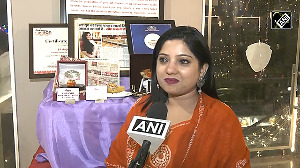The Tatas have found steady support from their bankers and Standard Chartered Plc chief executive Peter Sands for the Corus deal. They have been involved with three critical Tisco deals - the Nat Steel in Singapore, Millennium Steel in Thailand and now the biggest one - Corus. So what's it been like for the bank?
Sands says, "I am delighted that I chose this particular week to begin my first visit to India as a chief executive, I have been to India many times before, but this is my first as a CEO. What a great week it has been - first you had the S&P upgrading the country, then the announcement of Tata winning Corus and of course the icing on the cake was India beat West Indies (in cricket) and I wish I could claim credit for all these!"
"But I think we have played a role in helping rating agencies understand where India's gone, we have been one of the voices that have been saying for a long time that India's progress and development has been under-rated by the international financing community and we are proud we played a role as bankers to Tata, in the three deals."
Excerpts from an interview given to CNBC-TV18
It has got a thumb's up from corporate India and from the government but the market seems to have given it a thumb's down - is it overvalued? Are the markets being exaggeratedly harsh at this point time?
We are bankers to the deal and so obviously we feel it's a good deal. I have been involved in acquisitions myself and I was a finance director of Standard Chartered for many years and markets often have a first reaction to a deal, which is still a little bit negative - a little bit questioning about the valuation.
And that was certainly the experience in Standard Chartered's biggest deal, which we did a couple of years back in Korea and that's been a great success and Tatas have a great record in making deals work.
There are questions marks on how this is going to be financed and we have reports that you are going to put in around $3.5 billion - is that correct?
We are going to be making a substantial amount available to the Tatas. I cannot be specific but it will be a substantial chunk.
But is it in the region of that amount?
It is going to be in that region.
Historically, in a leveraged buyout like this, what is the ideal mix of raising the money?
I don't think there is a total ideal mix. What one has to make sure one has got is a financing structure that interacts sensibly with the operational cash flows, and the nature of the synergies arising from the deal itself. And as a banker to this deal, I am confident that we have exactly that kind of structure.
At this price people are now questioning whether the job cuts are going to happen much sooner, what are the integration issues to your mind, that are going to be critical initially?
Every deal brings risks with it, but the Tatas have got a very good record, in actually, delivering the kind of synergies that underpin the valuations of transactions they have done. As per our experience, there are some critical things in terms of the speed of realisation of the synergies, but also there are softer issues that whenever you bring companies together should not be underestimated.
Typically for a deal in the commodities space - because it's a cyclical business and we are sitting on the top of a commodity cycle within the steel business at this point in time, what are the risks for a deal or buyout of this size?
There are always risks in big transactions and those risks are considered by us as bankers, and certainly by the Tatas but they are not different from the risk that you have in any transaction. In every transaction you do, you have to be confident.
What sort of steel cycle have you factored in? What sort of prices have you factored in?
It is the same with every transaction. You have to look at the financial projects in terms of various scenarios and the reality is, there is nothing clear or as mathematical as any sort of commodity cycle. It's more unpredictable that that, so you have to forecast various scenarios and that is true of any kind of commodity.
In every deal we have to look at the financials, we have to be clear on synergies and not just identify them, but how are you going to deliver them. You have got to be clear about management issues, cultural issues and this deal is not going to be any different from any other transaction in that respect.
Do you see a lot more deals going through this auction process?
Lot of deals do end up as auctions, But the important part of this deal is, the signals it sends both to the international business community of what's happening with India and what signals it sends within India - about the opportunities present.
There has been a lot of transactions, where Indian companies have been involved in making acquisitions outside India and we have been involved in a many of them. There have been quite a number of Indian companies that have been thinking about it and haven't actually done it, but with the success of this transaction, they will now have the confidence to take that extra step and move, So, what one will therefore see is, acceleration of the internationalization of Indian business and that is an enormously positive thing for the Indian economy.
For more such reports, log on to www.moneycontrol.com





